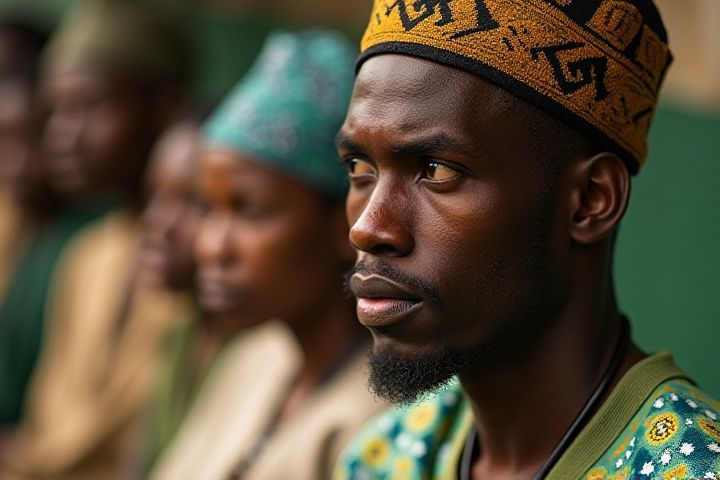
Nigeria is a linguistically diverse country, home to over 500 distinct languages. The official language is English, inherited from British colonial rule, and it serves as the primary language of government, education, and commerce. However, indigenous languages such as Hausa, Yoruba, and Igbo are widely spoken and form the backbone of cultural identity for many Nigerians. Each of these languages boasts rich traditions, local dialects, and literature that contribute to Nigeria's vibrant cultural tapestry. Engaging with these languages can enhance your understanding of Nigeria's diverse heritage and foster deeper connections with its people.
Official Language: English
Nigeria's official language is English, a legacy of colonial rule that has become a vital tool for national communication and governance. Despite having over 500 indigenous languages, English serves as the unifying medium for the diverse multicultural population, facilitating education, business, and diplomacy across the country. In government and legal matters, proficiency in English is essential, enabling access to opportunities for millions of Nigerians. You will find that this linguistic framework not only enhances social cohesion but also promotes Nigeria's active participation in international affairs.
Yoruba
Yoruba is one of the prominent languages spoken in Nigeria, primarily in the southwestern region. It belongs to the Niger-Congo language family and has approximately 20 million native speakers. Rich in cultural heritage, Yoruba is not only a means of communication but also a vehicle for folklore, traditional music, and religious practices. The language features a complex tonal system with three main tones, which can change the meaning of words significantly.
Hausa
Hausa is one of the most widely spoken languages in Nigeria and serves as a key lingua franca in the northern regions of the country. With over 50 million speakers, it belongs to the Chadic branch of the Afro-Asiatic language family. Recognized for its rich oral traditions, Hausa encompasses a variety of dialects and is often used in trade, education, and media, making it integral to Nigeria's cultural identity. If you are exploring Nigerian languages, understanding Hausa can significantly enhance your appreciation of the country's diverse linguistic landscape.
Igbo
Igbo is one of the major languages spoken in Nigeria, primarily by the Igbo people in the southeastern region. It belongs to the Niger-Congo language family and features its unique phonetic and tonal properties. The language is rich in oral traditions, proverbs, and cultural expressions, reflecting the values and history of the Igbo community. With over 40 million native speakers, Igbo serves not only as a means of communication but also as a vital cultural symbol within Nigeria's diverse linguistic landscape.
Pidgin English
Nigerian Pidgin, often referred to simply as Pidgin or Naija, is a widely spoken creole language that combines elements of English with various indigenous languages. Originating during the colonial era, it served as a lingua franca among diverse ethnic groups, facilitating communication in trade and social interaction. Nigerian Pidgin is characterized by its unique vocabulary, grammar, and pronunciation, making it distinct from Standard English while remaining intelligible to English speakers. This vibrant language reflects Nigeria's rich cultural tapestry and is increasingly recognized in literature, music, and mainstream media, serving as an important identity marker for its speakers.
Fulfulde
Fulfulde, also known as Fula or Fulani, is a widely spoken language in Nigeria, particularly among the Fulani ethnic group. It belongs to the Atlantic branch of the Niger-Congo language family and serves as a lingua franca in various regions of West Africa. With an estimated 15 million speakers in Nigeria alone, Fulfulde plays a significant role in cultural identity and communication among diverse communities. The language is characterized by its rich oral traditions, proverbs, and storytelling, which reflect the values and heritage of the Fulani people.
Kanuri
Kanuri is a prominent language spoken primarily in northeastern Nigeria, particularly in Borno State, where it serves as a vital means of communication for the Kanuri ethnic group. As part of the Nilo-Saharan language family, Kanuri showcases a rich linguistic history, with influences from Arabic and other regional languages often seen in its vocabulary. The language possesses several dialects, including the Central Kanuri, which is the most widely recognized. Learning Kanuri is essential for cultural immersion and is valuable for engaging with the traditions and history of the Kanuri people.
Tiv
Tiv is a Niger-Congo language primarily spoken by the Tiv people in Nigeria, predominantly in Benue State, where it serves as a vital medium of communication and cultural expression. With approximately 3 million speakers, Tiv plays an essential role in the preservation of Tiv traditions, stories, and folklore. The language features a rich system of tonal distinctions, which significantly influences meaning and enhances its unique phonetic qualities. Learning Tiv can deepen your understanding of the Tiv community's values, social structures, and historical context.
Ibibio
Ibibio is a member of the Niger-Congo language family, predominantly spoken in southeastern Nigeria, particularly in Akwa Ibom State. It serves as the primary language for the Ibibio people, encompassing various dialects that share common linguistic features. Rich in proverbs and oral traditions, Ibibio boasts a unique tonal structure, illustrating the cultural nuances of its speakers. For those interested in African languages, understanding Ibibio can deepen your appreciation of the region's diverse linguistic landscape.
Edo
Edo, also known as Bini, is the primary language spoken by the Edo people in Nigeria, particularly in the Edo State region. This language belongs to the Niger-Congo family and has several dialects that reflect the diverse cultural heritage of its speakers. Edo is characterized by its rich oral traditions, proverbs, and folklore, which play a significant role in the community's identity and communication. For those interested in learning, mastering Edo can open doors to understanding the customs and traditions of the Edo people and enhancing your cultural connections.
